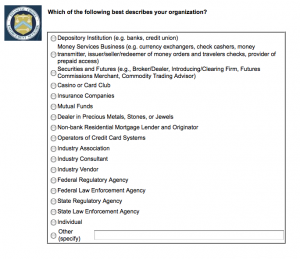Only Banks Might Want to Review How Criminal Banks Are
 The other day, I noted how–days after his department reported that suspected bankster crimes are growing quickly and terrorist financing crimes are going down–Treasury Department fired FinCEN head, Jim Freis. Given some of the reporting describing the firing, which explained that Treasury wanted to focus on things like terrorist financing whereas Fries had been focusing on things like mortgage fraud, I wondered whether Treasury fired Freis, in part, for showing that the emphasis on terrorism resulted in the neglect of bankster crimes.
The other day, I noted how–days after his department reported that suspected bankster crimes are growing quickly and terrorist financing crimes are going down–Treasury Department fired FinCEN head, Jim Freis. Given some of the reporting describing the firing, which explained that Treasury wanted to focus on things like terrorist financing whereas Fries had been focusing on things like mortgage fraud, I wondered whether Treasury fired Freis, in part, for showing that the emphasis on terrorism resulted in the neglect of bankster crimes.
Today, FinCEN sent out notice of a survey to determine how useful that report and another yearly report–on Tips and Trends–they produce are (note, the email notice says an invitation to the survey is here, but as of 8:15 it is not).
As a subscriber to e-mail updates from the United States Department of Treasury’s Financial Crimes Enforcement Network (FinCEN), FinCEN invites you to participate in a survey assessing the value of two of our recurring publications: The SAR Activity Review-Trends, Tips & Issues and The SAR Activity Review-By the Numbers. This invitation has been sent to you in follow up to FinCEN’s prior e-mail notification. A copy of that notice and this invitation can be found on FinCEN’s official website at http://www.fincen.gov/hotTopics.html
To participate in this completely voluntary survey, please click on the following link: https://svy.cfigroup.com/cgi-bin/qwebcorporate.dll?idx=HWGKEN Please note that this link will direct you to a website hosted by the CFI Group, which FinCEN has commissioned to conduct this survey. FinCEN has obtained permission from the Office of Management and Budget through control number 1090-0007 to conduct this survey in accordance with the Paperwork Reduction Act (44 U.S.C. § 3501-3520) and its implementing regulations (5 C.F.R. Part 1320).
Through the survey, we hope to learn more about your needs and identify opportunities to improve these products. The results of the survey will be reported to FinCEN only in the aggregate; individual responses will be grouped anonymously along with those of other FinCEN customers.
On behalf of FinCEN, thank you in advance for your cooperation and insight. Should you have any questions about this effort or want to provide additional feedback, please contact Barbara Bishop, Regulatory Outreach Project Officer, at 703-905-5137.
Sincerely,
Jamal El-Hindi
Associate Director
Regulatory Policy and Programs Division
There is nothing inherently problematic about the survey. It shows a desire to improve the usability of the documents. Moreover, the Tips and Trends reports include an abbreviated paper version of the survey at the end.
 That said, both questionnaires reveal something telling about FinCEN’s sense of customer. In its question asking what industry FinCEN report recipients work in, it doesn’t ask about media at all. That is, it envisions its audience to include only financial industry insiders, their regulators, and law enforcement.
That said, both questionnaires reveal something telling about FinCEN’s sense of customer. In its question asking what industry FinCEN report recipients work in, it doesn’t ask about media at all. That is, it envisions its audience to include only financial industry insiders, their regulators, and law enforcement.
Even more interesting, the survey envisions just two uses for its By the Numbers report showing the aggregate numbers of Suspicious Activity Reports for the previous year:
- Usefulness in improving your [Bank Secrecy Act]/Anti-money laundering compliance program
- Usefulness in comparing filing volumes across states and territories
That is, it doesn’t envision the possibility that anyone–Congress or journalists or citizens–might want to know overall trends in suspicious activities. That is, the survey doesn’t envision that citizens might want to know that incidents of suspected terrorist financing in banks fell 14% last year and computer intrusion (hacking) 21%, while suspected consumer loan and mortgage loan fraud went up 127% and 31%, respectively.
Again, there is nothing necessarily suspect about this. Except that, at a time when the number of suspect activities from bankers continues to grow, catering your reporting to whether the banks are happy might not result in the most meaningful reporting.


Nothing inherently useful either.
Ordinary customers might well be interested in this, as they would be in knowing the malpractice history of their would be or actual doctors and lawyers. But then ordinary policing is so inconvenient for those policed, except for ordinary citizens, who are just meant to show respect or face the consequences of the hurt pride of the police. Nearly as important, I suppose, is that policing isn’t as hot, sexy, unthinkingly overfinanced and accountability free as “fighting terrorism”.
The possibility that our rulers do not realize how obvious they are is chilling.
@earlofhuntingdon: Well, that’s the thing. Since SARs are highly classified, we’ll only ever know in aggregate. But since they’re classified, if this reporting is cut or changed there will be no record at all.